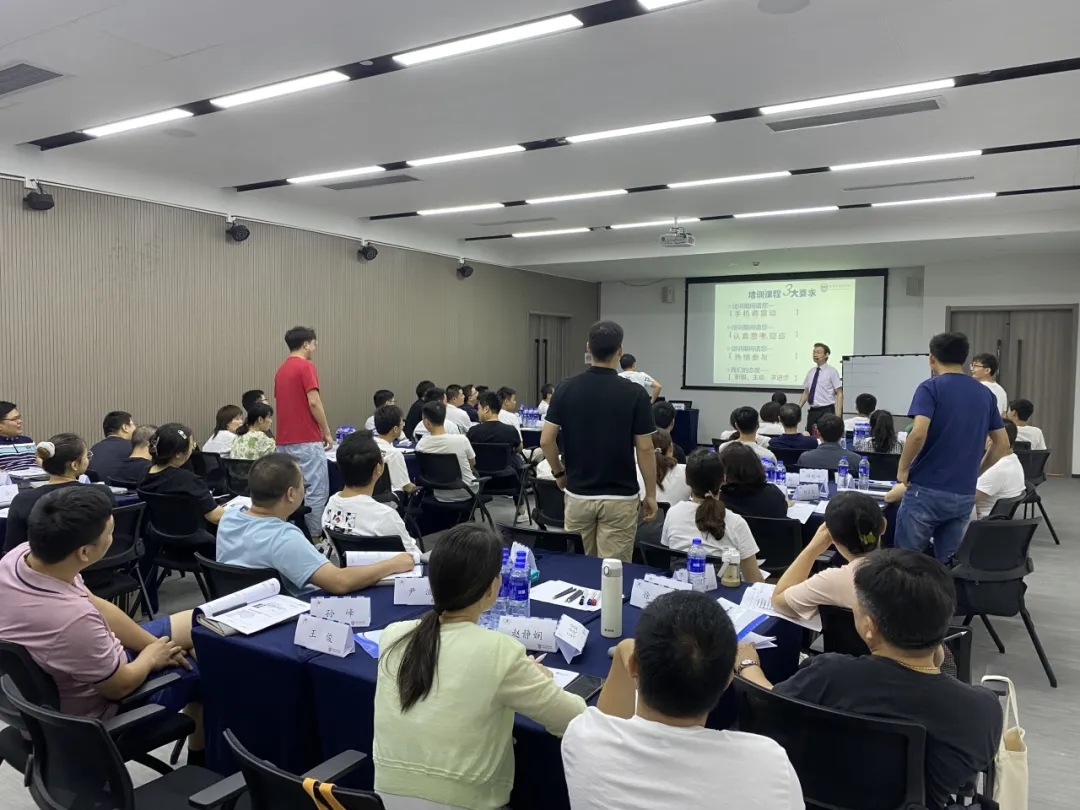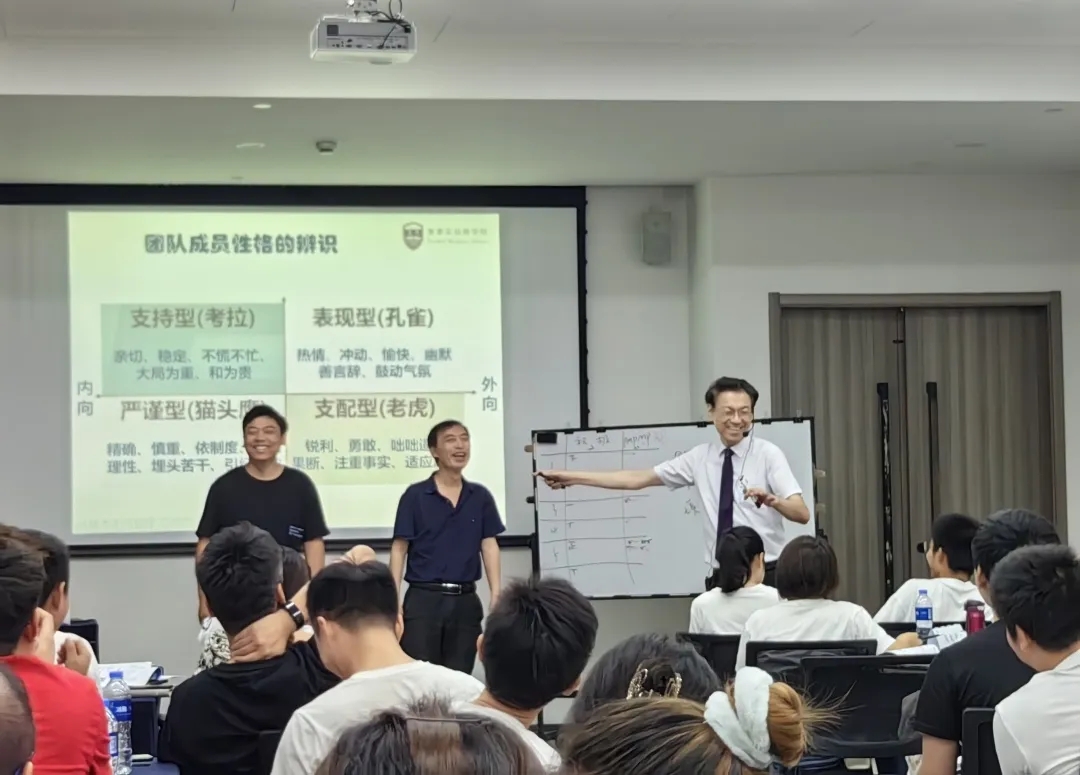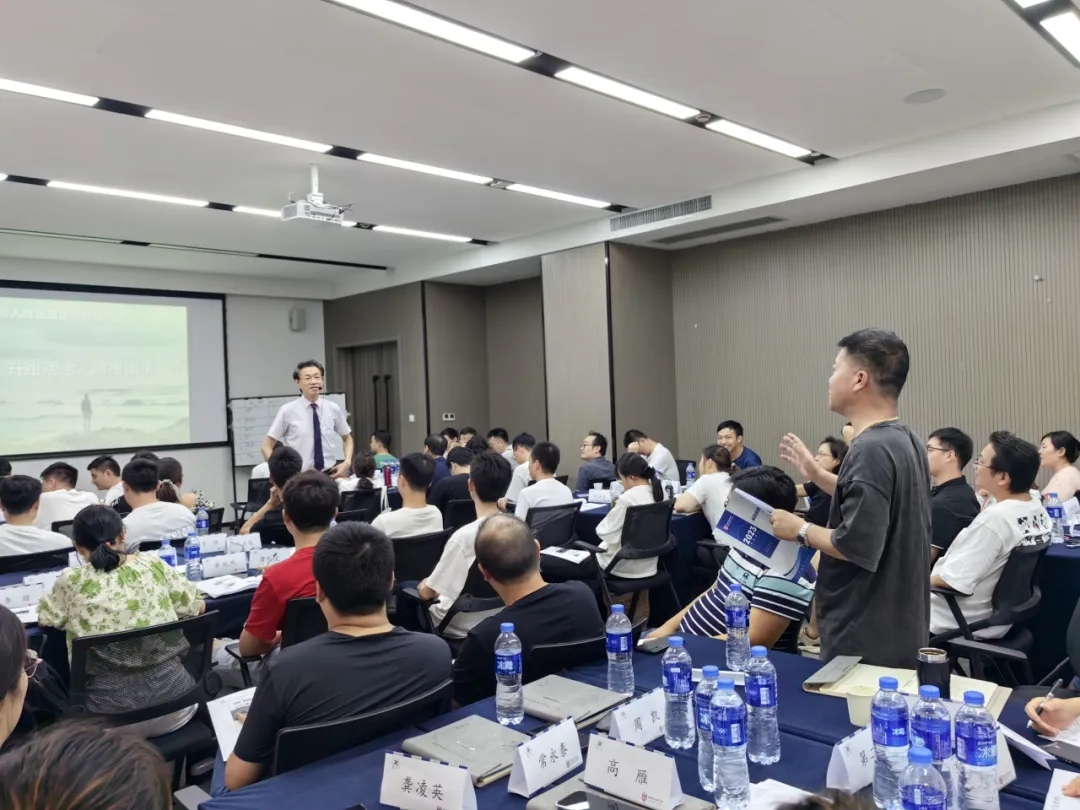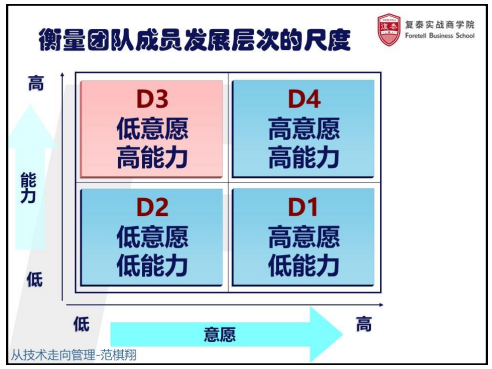On August 13, 2023, the fourth course of the Elite Training Program of Jinghe Talent Cultivation Program was held - "From Technology to Management". This course mainly focused on a pioneering training of the thinking mode for young management cadres. Managers must first change their thinking mode before they can carry out daily management work more scientifically. Not only should one shift from the previous identity of a technical staff member to that of a department manager, but also undergo changes in various aspects such as the management objects, management methods, and self-requirements.
The course of the day was carried out from five aspects: the role cognition of managers, the responsibilities of managers, how to build team cohesion, the four major skills of flexible leadership deployment, and the skills of effectively motivating teams. It summarized the different usages corresponding to the four leadership forms of guidance, coaching, support and empowerment. As a manager, it is necessary to identify the personality and ability types of team members, formulate customized training plans based on their different personality colors, and be able to better motivate subordinates when allocating tasks. Through active thinking and participation in discussions, the students expressed that they had gained a lot.

Part One: Role Cognition of Managers
Let's start with a philosophical proverb by Tagore: "The hardships and pains you endure today will eventually turn into light, illuminating the path of life." The teacher then combined the negative extreme and positive fortune in the Five Elements and Eight Trigrams to analyze the role transformation of managers from the perspective of yin-Yang constellations, and comprehensively analyzed the role transformation of managers from three aspects: action, quality and attitude. He informed the trainees that they should be harmonious managers, gentle, inclusive and accepting of different people, and have a broad management perspective. As a manager, one should shift from focusing on "matters" to "people", devote more time and energy to doing a good job in overall coordination, and leave the space and time for solving problems to subordinate employees. Managers need to: be meaning oriented: foresee the future, depict the vision, present it passionately, boost morale, be approachable, and have personal charm;
Talent-oriented: Teaching according to individual aptitude, skill cultivation, life guidance, stimulating potential, and guiding self-awareness.
Task-oriented: task allocation, performance evaluation, care, job scheduling, and output guarantee - these five aspects are the key points to start transforming the role of a manager.
Every goal must have a plan
Everything planned will have an outcome
There must be responsibility for every outcome
Every responsibility must be inspected
There must be rewards and punishments for every inspection
Employees should be identified based on the personalities of team members. Employees should be classified into dominant (tiger), expressive (peacock), supportive (koala), and rigorous (owl) from the dimensions of introversion and extroversion, sensibility, and rationality. Manage people based on their different personality traits. Managers at different levels have different work priorities. It is necessary to be clear about the work priorities of your own position and also understand the expectations of your superiors. However, the trials you are going through today will surely be the foundation for your successful transformation in the future.

Part Two: The Responsibilities of Managers
From a management formula: life/work outcome = Way of thinking * Enthusiasm * ability, it can be concluded that if one of the multiplies is zero, the result will also be zero. Even if you are highly enthusiastic and your ability improves at work, if your way of thinking is limited, your work outcome may not be positive. Therefore, managers need to think in a higher dimension and act in a lower dimension, transforming their way of thinking from four perspectives:
The extent of your vision determines the extent of the world you can see.
The depth of looking at problems distinguishes the levels among people.
Execution ability is the ultimate form of self-discipline.
A fearless mindset is a standard feature of the strong.
Meanwhile, the organization also puts forward requirements for managers:
First of all, as a performance creator, doing the right things at work is more important than doing things right. Seize the task results and gain intangible performance: customer satisfaction, employee willingness, and teamwork.
Secondly, it is to motivate the instructor. They should have a proactive and positive attitude, be brave to face problems, play the role of an outstanding coach, teach on-site work, and trigger employees to learn quickly.
Furthermore, there are cultural shapers who encourage learning culture, performance-oriented culture, advocate core values, and shape a common vision.
Finally, there are change managers, adaptability, and the management of internal and external changes, which can trigger a transformation in thinking patterns.

Part Three: Building Team Cohesion - Cultivating Passion
This paper focuses on explaining the influence of managers, starting from both authority influence and non-authority influence. Managers should emphasize cultivating their non-authority influence. It is introduced that non-authority influence is composed of the following factors:
1. Character factors: The moral qualities, personality, and style of the leader, etc.
2. Ability factor: It refers to the work skills and talents one possesses.
3. Knowledge factor: Knowledge is the foundation of ability;
4. Emotional factors: Respect, understand and care for others.
Non-power influence, also known as non-coercive influence, mainly stems from the charisma of a leader's personal actions, and from the mutual inspiration and mutual trust between the leader and the led. Cultivate the cohesion of the team and the passion of team members through one's own management influence.
Part Four: Four Skills for Flexible Leadership Deployment
The degree of ability and willingness demonstrated by team members when accepting, being responsible for and taking on a specific task or activity. Ability and willingness interact with each other, and each factor will affect the other. The interaction among them varies from person to person. However, the team leader is the coach of the team members. If the employees do not act, then the leader needs to enhance the employees' abilities through guiding behaviors. If the employees are unwilling, then we managers need to take supportive behaviors to enhance the employees' willingness. The scale of the development level of team members is divided into four types: High willingness but low ability Low willingness and low ability High willingness and high ability; low willingness and high ability. The different levels facilitate the analysis of employees' behaviors.

Part Five: Effectively Motivating Team Performance
Through the integration of the six major incentive factors - personality, different incentive methods are provided for employees with different personalities. The research analyzing the Gallup path shows that there is an inevitable connection between organizational atmosphere and employee performance, and they are mutually causal. The higher the employee rating is, the better the company is and the more likely it is to generate high performance. The practices of outstanding organizations in unlocking the potential of their employees and retaining core customers are strikingly similar. They focus on developing people's potential and subsequently achieve continuous profits. The effect of Q12 in motivating employees is also very significant. Managers should incorporate the 12 items into their management work and be clear about what employees gain from them.
The one-day course was extremely wonderful and rich. The teacher was very humorous and witty. The students listened very attentively and seemed reluctant to leave. Even after the class ended, they were reluctant to leave and wanted to ask the teacher for more advice. Some outstanding students got the opportunity to communicate further with the teacher and took autographed photos. The students who got the chance were very active in communicating with the teacher.
Through the training and learning of the course, not only has the confidence of the trainees been increased in doing their jobs well in the future, but also a solid foundation has been further laid. A qualified and outstanding management cadre should adapt to the development of the company. In the workplace, one should have a down-to-earth working style, a flexible mind and a persistent heart to serve employees wholeheartedly. One should be good at summarizing and accumulating work experience, expanding work ideas, and having innovative thinking. One should apply the knowledge learned to the actual work, handle the harmony among colleagues, people and leaders well, create a good working atmosphere and improve work efficiency.
This day's study is a valuable asset for the trainees. In their future work, the trainees will surely live up to the company's cultivation, arm their minds with the knowledge they have learned, guide their practical work, and contribute their own strength to the strengthening of Jinghe, the development of national enterprises, and its expansion into the world.